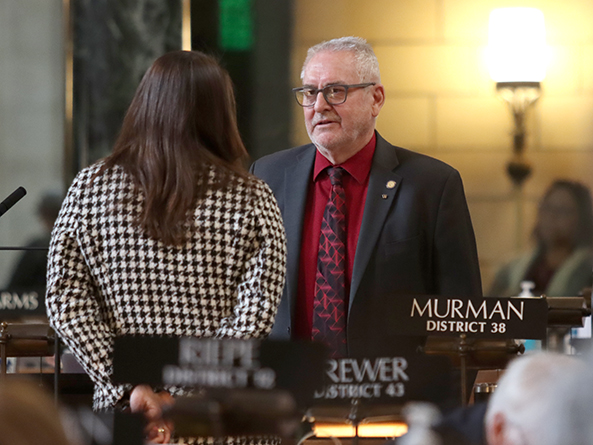Age verification for adult website access clears first round
Lawmakers gave first-round approval March 27 to a measure that would require websites containing sexually explicit content to verify a user’s age.

LB1092, introduced by Glenvil Sen. Dave Murman, would adopt the Online Age Verification Liability Act. The bill would bar a commercial entity from knowingly publishing or distributing material harmful to minors online by requiring them to use a reasonable age verification method to ensure that anyone attempting to access such material is at least 18 years old.
The age verification requirement would apply only if a “substantial portion” of the website’s content, defined as one-third or more, meets the bill’s definition of being harmful to minors.
Murman said the adult entertainment industry currently has “free rein” to provide minors with access to sexually explicit content. Such content damages young people’s understanding of intimate relationships, he said, and can lead to sexual aggression, anxiety, depression and dangerous sexual behavior.
“The research finds that childhood exposure to pornography is not only linked to serious mental health problems for our kids, but also influences behaviors which are linked to violence — especially toward women,” Murman said.
Under the bill, digitized identification cards, third-party age-verification services or a method that relies on public or private transactional data to verify a person’s age would qualify as a reasonable age verification method. A commercial entity or third party that performs an age verification would be prohibited from retaining a person’s identifying information after access to the material has been granted.
LB1092 also would allow individuals, parents or guardians harmed by an entity that violates the act’s provisions to pursue a lawsuit and potentially recover damages. The bill would not apply to any legitimate news-gathering organization or broadcaster, and internet providers would not be held liable if a minor accesses explicit content due to an entity’s failure to implement an age verification method.
Seward Sen. Jana Hughes spoke in support of the measure. She said the Legislature has a responsibility to ensure businesses and websites operating in Nebraska have safeguards in place.
“Let’s get Nebraska one step closer to protecting our kids,” she said.
Speaking in opposition to LB1092, Bellevue Sen. Carol Blood said Nebraska lacks the needed technology infrastructure to keep citizens’ data and personal information safe from bad actors. Requiring adults to upload their ID to the internet could put them at risk for identity theft or disclose their location, she said, which in turn could compromise a person’s safety.
“If you keep passing these technology bills and you don’t have a strong foundation, you are opening up others to the very thing you’re trying to protect children from,” Blood said. “If we are worried about sex trafficking and grooming, we should be worried about this bill and make sure it’s right.”
Blood also raised concerns regarding who would determine whether a website’s content meets the bill’s definitions and about the measure’s lack of an enforcement mechanism. She said the bill was well-meaning but “not ready for prime time.”
Murman said he would introduce an amendment on select file to address concerns regarding the security of age verification methods.
Sen. Megan Hunt of Omaha also opposed LB1092 and said parents can protect their children from harmful content as they see fit.
“I trust parents … to raise their children, raise their families [and] put their own limitations on screen time and technology in their homes,” Hunt said.
Omaha Sen. Machaela Cavanaugh filed several motions to extend debate on the measure. She questioned its effectiveness to protect children when adult content is easily accessible on social media platforms, which are not covered under the bill’s provisions.
Following several hours of debate spanning two days, lawmakers adopted a technical amendment offered by Murman on a 30-1 vote and another from the Judiciary Committee 30-0. They then advanced LB1092 to select file 30-1.


